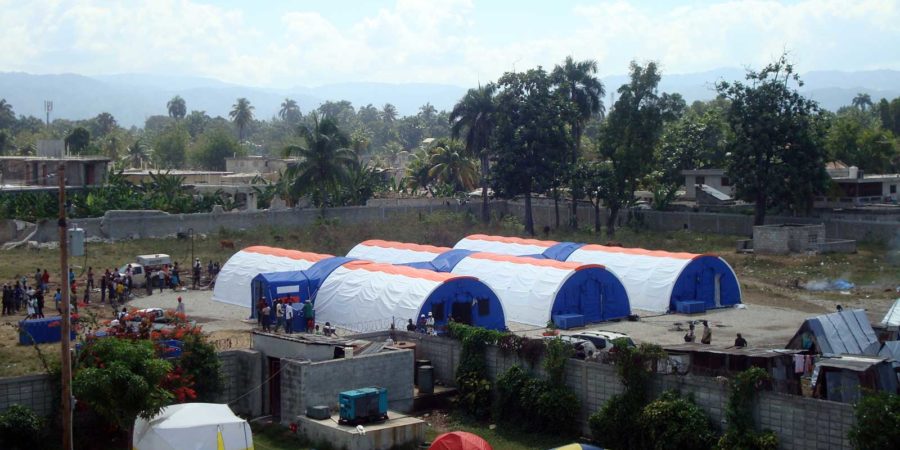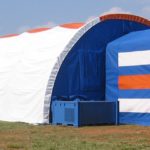Hurricane Matthew Emphasizes the Need for Emergency Preparedness and Mobile Medical Facilities
BLU-MED® 25-bed mobile hospital deployed in Leogane following the 2010 Haiti earthquake.
The 2016 hurricane season is in full swing and the forecast for the season’s peak (occurs around September 10 each year) is promising to be a devastating one.
Having inflicted destruction across many Caribbean islands including the Bahamas, Cuba, Haiti and Jamaica, Hurricane Matthew now threatens Florida and other east coast states.
Authorities are warning residents of Florida to prepare for what could be the worst major storm to hit the state in more than 10 years. Hurricane Matthew is moving northwest at 14 MPH with sustained winds of 138 MPH and gusts up to 167 MPH.
Hurricane Matthew is expected to remain a category 3 or 4 hurricane as prediction models have the storm tracking along the east coast of Florida. Being as this is a unique hurricane path, meteorologists and hurricane specialists are warning the actual track of Hurricane Matthew could deviate and have major consequences for residents of cities directly hit.
Florida Governor Rick Scott activated the Florida National Guard on Tuesday in expectation of evacuations, inland flooding, a life-threatening storm surge, and warned more than 8 million residents to prepare for prolonged power outages.
South Carolina Governor Nikki Haley ordered the evacuations of more than one million people living in coastal cities.
Still feeling the effects of recent flooding, on Monday, Governor Pat McCory of North Carolina declared a state of emergency in more than 66 counties and warned of additional flooding from Hurricane Matthew.
FEMA is using Fort Bragg in North Carolina as a staging depot and command post for tractor-trailers arriving with disaster recovery items including blankets, generators, water, food and cots in an effort “to be able to respond quickly” stated Mary Hudak, a spokeswoman for FEMA’s southeastern region.
Large scale disasters like Hurricane Matthew emphasize the need for portable and scalable mobile hospitals. The ability to easily transport and quickly deploy a portable hospital to affected areas and begin treatment within 72 hours is key to minimizing loss of life. In the event of hospital surge and overflow or when primary healthcare facilities have been compromised and are no longer operational, mobile hospitals are the only facilities capable of meeting the immediate needs to treat the surge of thousands of traumatized, sick, and injured patients.
BLU-MED Response Systems® has extensive experience in responding to disasters of all types and around the world. BLU-MED mobile hospitals are designed for rapid deployment to affected areas and provide a self-contained, climate-controlled, and clean environment for practicing advanced-level medical care at the point of need. Our mobile medical facilities can be equipped to meet the immediate needs and reconfigured as medical needs expand or change.
BLU-MED maintains a disaster response stockpile that includes turnkey mobile hospitals, command centers, offices and workspaces, and housing. The BLU-MED disaster response stockpile is ready for deployment immediately to any location in the world.
To inquire about BLU-MED mobile medical facilities, logistics services for arranging the shipping and transporting of supplies, equipment and other goods in response to emergencies and disasters, as well as discuss our technical consulting services regarding the design and implementation of mobile hospital and treatment facilities for use in emergency and disaster response, please call us at +1-425-739-2795 or fill out a contact form.


